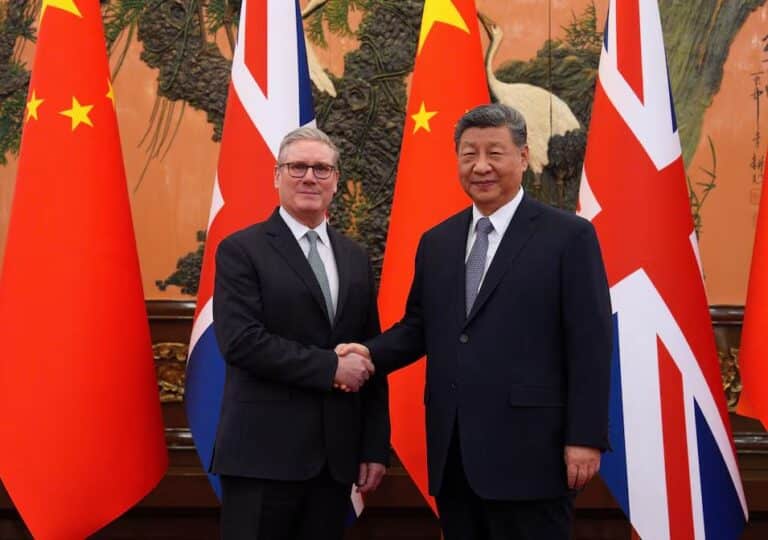
In a powerful new report released by Oxfam International at the World Economic Forum (WEF) in Davos, startling revelations about the wealth extracted by the United Kingdom from India during colonialism were unveiled. According to Oxfam, between 1765 and 1900, the UK siphoned off a staggering USD 64.82 trillion from India, with the richest 10% of the population receiving the lion’s share—USD 33.8 trillion in today’s money. This amount, Oxfam pointed out, is enough to cover the surface of London with £50 notes nearly four times.
The Oxfam report, titled “Takers, Not Makers,” sheds light on the historical underpinnings of modern-day global inequality, claiming that colonialism laid the foundation for today’s economic disparities. The report explains that the wealth extracted from colonies like India was used to enrich the few at the expense of the many, with the newly emergent middle class also benefiting significantly from the colonial economic systems.
“The legacies of inequality and plunder from colonial times continue to shape the modern world,” Oxfam asserts. The organization emphasizes that colonial practices set the stage for modern multinational corporations, many of which owe their origins to entities like the East India Company. These corporations, which monopolized resources and wealth, are now often the same ones that exploit workers in the Global South, especially women, to benefit wealthy shareholders based in the Global North.
Moreover, the report draws attention to the stark wage disparity between the Global South and the Global North. According to Oxfam’s findings, wages in the Global South are up to 95% lower than those in the Global North for similar work, underscoring the ongoing exploitation of labor from poorer nations to fuel the wealth of richer ones.
The wealth extracted from India didn’t just benefit the richest 10% in the UK. Oxfam highlights that a significant portion of this wealth was also siphoned off by the newly emerging middle class in the UK. This group, which gained prominence during and after colonial rule, reaped the benefits of both colonial trade and the systematic exploitation of resources.
Oxfam’s report also details how colonialism stunted India’s industrial growth. In 1750, India accounted for 25% of global industrial output, but by 1900, this had plummeted to just 2%. This decline was driven by British-imposed protectionist policies that crippled India’s textile industry, a key sector of its economy.
While colonialism devastated India’s economy in many ways, the impact of the First World War presented a brief respite. The disruption of colonial trade during the war allowed India’s industrial sector to grow, a growth pattern that still influences economic trends in the region today.
The report also links colonialism with the rise of modern multinational corporations, which in many ways were pioneered by colonial enterprises. These corporations, often granted monopolies during the colonial era, profited immensely from the exploitation of colonies and their resources. Oxfam argues that these companies, in the modern era, continue to operate with the same exploitative models, particularly in their global supply chains.
Workers in the Global South, who are often subject to poor working conditions and minimal pay, are still exploited by multinational corporations that benefit from cheap labor. Oxfam asserts that these modern forms of economic domination perpetuate the inequality created by colonialism.
In addition to the economic impact, Oxfam points to the social and cultural damage wrought by colonialism. The caste system in India, for instance, was formalized and entrenched by British colonial rule, contributing to the deep divisions in Indian society. Furthermore, colonial powers used policies that disrupted the social fabric and exacerbated divisions based on caste, religion, and ethnicity.
Oxfam also addresses the role of the British Empire in fueling the global drug trade. The British East India Company played a key role in promoting the opium trade, which caused devastating social and economic consequences for both India and China. The opium trade not only harmed the populations of these countries but also became a major source of revenue for the British government.
The legacy of colonialism also extends to modern-day issues like “biopiracy,” where global corporations profit from resources taken from the Global South without compensation. A striking example cited in the report is the patenting of neem tree extracts by a US multinational corporation, despite the fact that these extracts had been used for centuries in India for various purposes.
The report concludes by noting the ongoing exploitation of fossil fuels, a legacy of colonial-era resource extraction, which has contributed to the climate crisis. Oxfam argues that colonial practices of resource extraction have set the stage for the environmental degradation that the world is now facing, further exacerbating global inequality.
In India, the impact of colonialism is still felt today, with stark divisions between the wealthy elite and the impoverished masses. Oxfam highlights the concentration of wealth and political power among the richest people in many former colonies, a situation that has remained largely unchanged even after independence.
The report also condemns global financial institutions like the World Bank and the International Finance Corporation (IFC) for their role in perpetuating inequality in the Global South. By financing privatized services, these institutions continue to support the economic structures that were established during colonial times.
Ultimately, Oxfam’s report calls for a reevaluation of the global economic system and the need for reparative measures to address the deep inequities created by centuries of colonial exploitation. Oxfam asserts that only by recognizing and addressing the legacy of colonialism can the world hope to achieve true economic justice.







